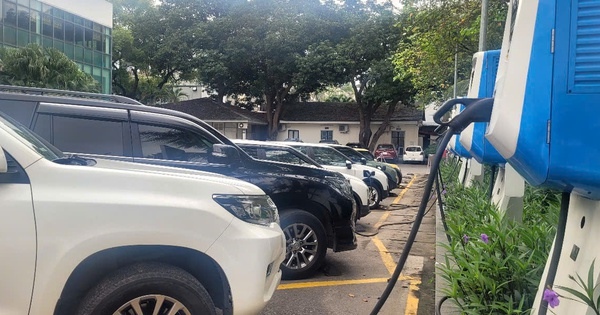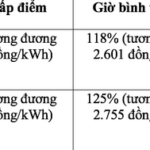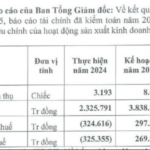The Prime Minister has issued Decision 14, dated May 29, outlining a new electricity retail pricing framework. This framework includes a dedicated pricing structure for electric vehicle charging stations.

Electric vehicle charging station retail electricity prices (rates calculated as a percentage of the current average electricity selling price of 2,204.0655 dongs/kWh, excluding value-added tax) |
Specifically, the electricity rates for this customer segment are lower than those for the business sector but higher than those for manufacturing.
The pricing structure is based on voltage levels, with the lowest rate set at 71% and the highest at 195% of the current electricity selling price.
For example, let’s consider the electricity rates for electric vehicle charging stations (rates calculated as a percentage of the current average electricity selling price of 2,204.0655 dongs/kWh, excluding value-added tax). For medium voltage levels and above (above 1 kV), the off-peak rate is 71% (approximately 1,565 dongs/kWh), the normal rate is 118% (2,601 dongs/kWh), and the peak rate is 174% (about 3,835 dongs/kWh).

Electric vehicle charging station retail electricity prices (rates calculated as a percentage of the current average electricity selling price of 2,204.0655 dongs/kWh, excluding value-added tax) |
For low voltage levels (below 1 kV), the off-peak rate is 75% (1,653 dongs/kWh), the normal rate is 125% (2,755 dongs/kWh), and the peak rate is 195% (4,298 dongs/kWh).
Previously, the Ministry of Industry and Trade suggested that if the production electricity rate were applied to charging stations, customers would pay less than the actual cost incurred by the system, resulting in a difference of 552-699 dongs/kWh, depending on the voltage level.
On the other hand, if the business electricity rate were applied, customers would pay more than the actual cost, resulting in an excess of 467-587 dongs/kWh, again depending on the voltage level.
Moreover, adopting either of these approaches would lead to cross-subsidization among different customer groups, which is not in line with the orientation outlined in Resolution 55 of the Politburo in 2020 regarding the strategy for Vietnam’s national energy development until 2030, with a vision towards 2045.
News by Le Thuy
– 17:08 31/05/2025
“TMT Motors Invests Nearly 100 Billion VND in Electric Vehicle Charging Station Venture”
“TMT Motors is proud to announce a significant investment of 98 billion VND in the establishment of TMT Electric Vehicle Charging Station Investment and Trading Joint Stock Company. With this investment, TMT Motors now owns 98% of the company’s charter capital, solidifying its position as a leading player in the electric vehicle industry. This bold move underscores TMT Motors’ commitment to driving innovation and sustainability in the automotive sector, as it gears up to revolutionize the way people power their vehicles.”
Electric Vehicle Revolution: Chinese EV Company Invests in Vietnam’s Charging Infrastructure, Aiming for 30,000 Stations
In a challenging year for the industry, TMT incurred a record loss of VND 325 billion in 2024. This significant deficit underscores the need for strategic adjustments and innovative approaches to navigate through turbulent market conditions.
The Power of Words: Captivating Copywriting for Effective SEO
The Rising Cost of Electricity: Gasoline’s Taxing Burden
The Long Thanh International Airport project has awakened from its slumber; the Finance Minister justifies the dual taxation on gasoline; new regulations on celebrity endorsements are unveiled; electricity prices surge from May 10th, and two groups of officials are to be laid off before the conclusion of the apparatus reorganization. These are the standout news stories from the past week.





















